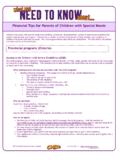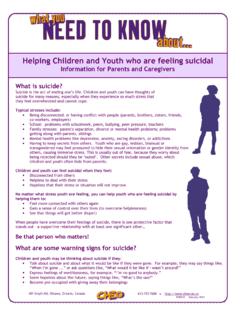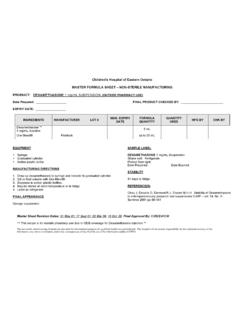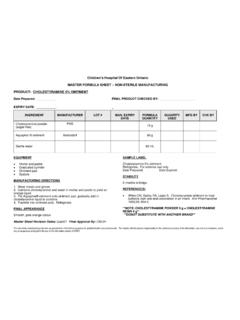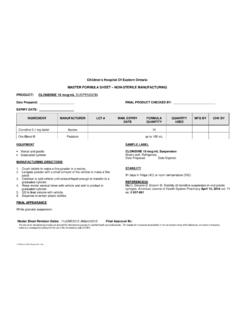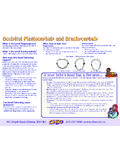Transcription of Helping Children and Youth with Psychosis …
1 401 Smyth Rd, Ottawa, Ontario, Canada 613-737-7600 P4935E February 2010 Helping Children and Youth with Psychosis Information for Parents and Caregivers What is first episode Psychosis ? First episode Psychosis is the first time that a person outwardly shows symptoms of Psychosis . These symptoms may be very distressing for Youth and their families. How common is Psychosis ? Between 3 and 5 out of every 100 people will have some form of Psychosis in their life time.
2 But only a small number of people with Psychosis will go on to have long term problems and may be diagnosed with schizophrenia. Close to 1 in every 100 people has schizophrenia. Schizophrenia is much less common in Children and Youth : only 1 out of every 1000 Children and Youth have it. What causes Psychosis ? Psychosis is very strongly linked to imbalances in certain brain chemicals called neurotransmitters, especially one called dopamine. It is also possible (but rare) for medical problems like brain tumours, Multiple Sclerosis, Huntington s Disease or infections to cause Psychosis .
3 Psychosis is a possible side effect of some prescription drugs. Street drugs are a big problem. Marijuana often leads users to feel paranoid. Other drugs like LSD, shrooms or magic mushrooms, heroin, cocaine or uppers (amphetamines) can trigger Psychosis too. What is Psychosis ? Psychosis is a serious medical problem where a child or teen has trouble telling the difference between what is real and what is not real. Sometimes, it starts with small changes in behaviour, where Children just don t seem like themselves.
4 Children or teens with Psychosis often have delusions or hallucinations. Delusions: Are fixed, false beliefs, not based in reality Can come in many forms, some are quite bizarre Paranoid delusions are common, where Children or Youth become suspicious of others and worried about being harmed by others. They may also think they are being spied on or followed. Hallucinations: These happen when a child or teen sees (visual hallucinations) or hears (auditory hallucinations) things that aren t there.
5 Psychosis is rare before puberty. And it starts at different times for men and women. For men with Psychosis , hallucinations and delusions often begin in their late teens or early 20 s. These symptoms tend to appear later in women, in the mid 20 s to early 30 s. It is also rare for someone over 45 to develop Psychosis for the first time. 401 Smyth Rd, Ottawa, Ontario, Canada 613-737-7600 P4935E February 2010 ? Will my child or teen get better?
6 Ongoing treatment and monitoring will give your child or teen the best chance of living without symptoms of Psychosis . Medications and other treatments are very effective for most people who have had an episode of Psychosis . We think that Children and Youth who have had an episode of Psychosis should stay on medication for at least one year. Studies show that after one year, 7 out of 10 patients who stay in active treatment will be in remission (not have any delusions or hallucinations). Most patients (about 65%) will not have any symptoms (or very few) with ongoing treatment.
7 How is Psychosis treated? Recognizing symptoms early on is important, because treatment can be much more effective if it is started early. Because Psychosis is linked to imbalances in brain chemicals (like dopamine), medications that help these imbalances can be very effective in controlling the symptoms of Psychosis . These medications are called anti-psychotics or neuroleptics. Commonly used neuroleptics include: Risperidone (Risperdal ), Olanzapine (Zyprexa ), Quetiapine (Seroquel ), Haloperidol (Haldol ) Chlorpromazine, also known as CPZ When can my child stop taking medication?
8 If your child or teen has good symptom control in the first year of treatment and wishes to come off medication, we can give it a try. It will be very important for your child or teen to be followed closely by a doctor. Some people will be symptom free, even after medication is stopped. But most patients will tend to have periods of Psychosis , or ongoing symptoms of Psychosis after stopping medication. If symptoms of Psychosis continue, especially if they last longer than 6 months, then doctors make a diagnosis of schizophrenia.
9 If you suspect Psychosis If you suspect Psychosis , bring your teen to a doctor (family doctor or pediatrician) as soon as possible. In most cases, the doctor will then refer your teen to more specialized mental health services. Some communities have first episode Psychosis clinics set up for these problems. You can also try calling TeleHealth Ontario and speaking to a nurse for advice, at: 1-888-797-0000 (TTY: 1-866-797-0007) If you are worried and if you can t get services set up quickly enough, you can take your teen to a hospital emergency room for an assessment.
10 After the symptoms of Psychosis are reduced enough by medications, it will be easier for your child or teen to benefit from counselling and therapy. 401 Smyth Rd, Ottawa, Ontario, Canada 613-737-7600 P4935E February 2010 Healthy living makes a difference. Make sure your child or teen eats healthy meals and snacks, gets enough sleep, and regular physical exercise (anything active is good, like dancing or playing "air-guitar".)
